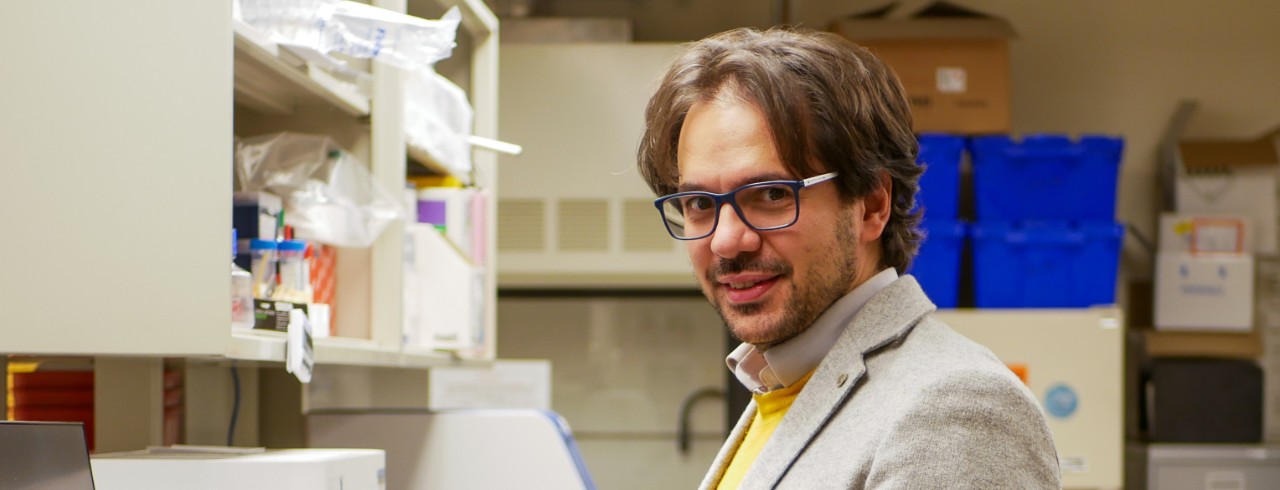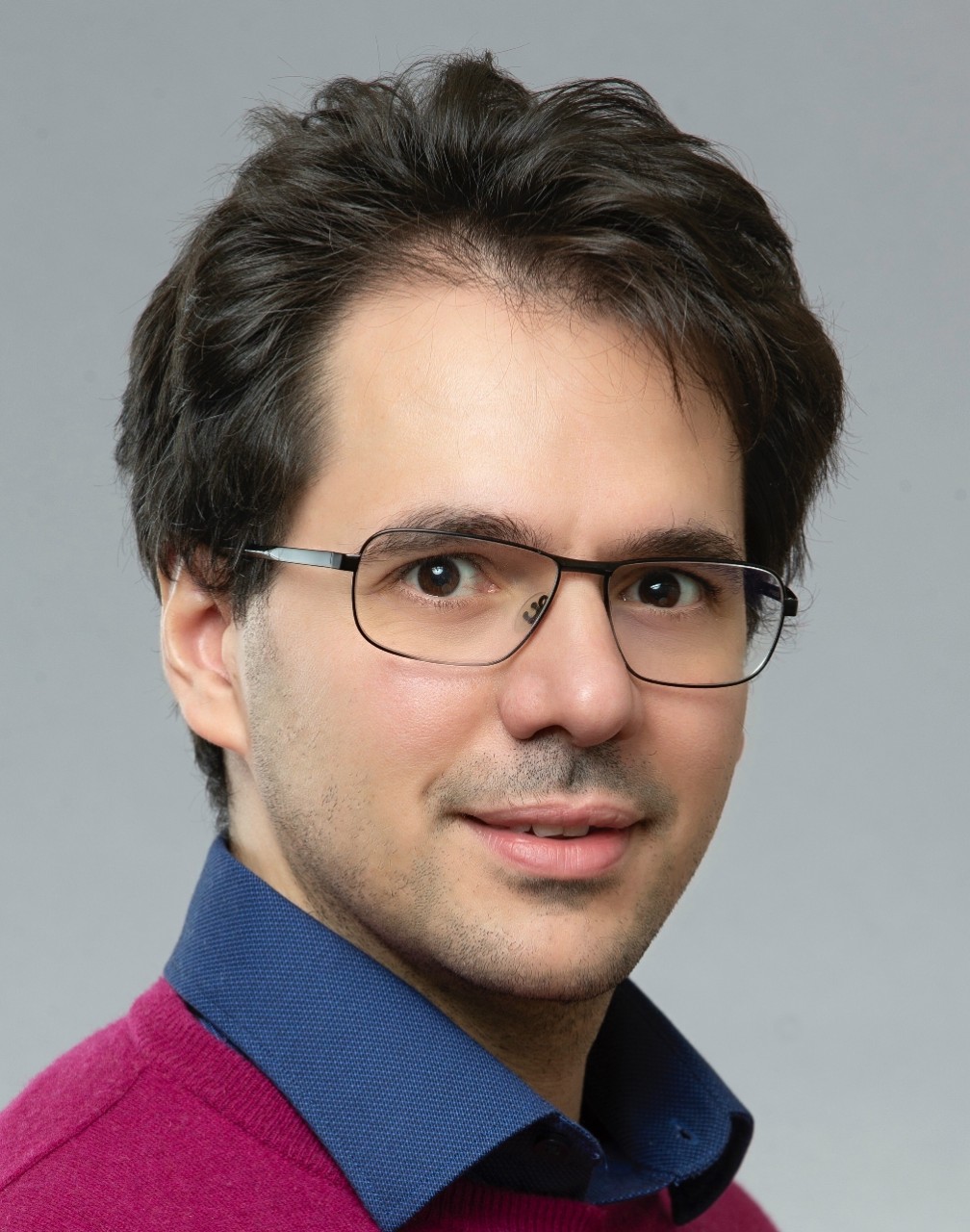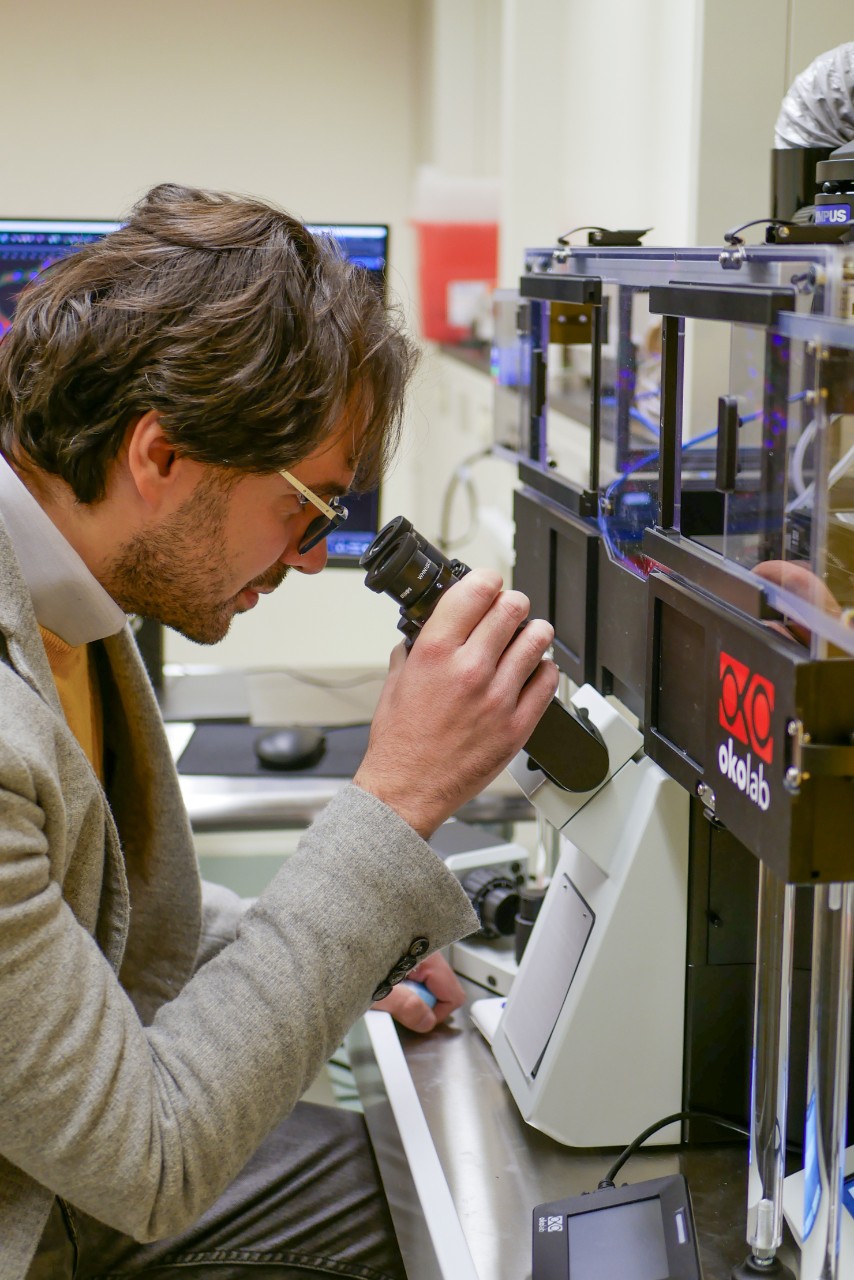
Professor builds organ-on-chip technology for personalized medicine
3D-printed human organs-on-chip could revolutionize the study of disease
Riccardo Barrile, assistant professor of biomedical engineering at the University of Cincinnati College of Engineering and Applied Science, is combining three powerful technologies — stem cells, 3D bioprinting and organs-on-chips — to create living human tissues and organs for use in drug screening, disease modeling and regenerative medicine.

Riccardo Barrile
“This synergistic approach enables us to build in laboratory high-fidelity human tissue constructs that replicate patient's specific genetic disorder, match the biochemical and mechanical properties of the native tissue in health and disease, or even enable us to test drugs and treatments on individual patient's cells,” Barrile said.
This research may someday lead to personalized medicine breakthroughs, fast-track development of new drug treatments, and eliminate the need for animal testing.
Barrile's efforts demonstrate UC's commitment to research as described in the university's strategic direction, Next Lives Here.
Barrile’s work at UC advances the previous research he performed at Wyss Institute for Biologically Inspired Engineering at Harvard University and Emulate, an organ-on-chip company that spun off from Harvard. Barrile developed vascularized organ-on-chip models of human lung and blood-brain barrier, which in contrast to conventional cell culture dishes, are designed to mimic the three-dimensional architecture and dynamic nature of human tissues.
“We are able to engineer microchips incorporating human cells and blood and simulate the mechanical forces that act on the human body, such as how blood flows through the vessels,” Barrile said. “These models have been shown to respond to various inflammatory cues and to sustain human blood flow, providing a unique platform for modeling of human biology and pathophysiology.”
These in-vitro solutions better match how our bodies would react to medications or other treatments compared to testing in animals, like mice. Ultimately, such devices could be created with cells obtained from individual patients to test which treatment to disease will work best in that specific patient — before they even take a dose.
It would also be a more economical and effective method of testing pharmaceuticals.
"The modern drug development process is long and expensive. Animals are used as standard preclinical models to screen for and exclude any potential toxic molecules and to select for highly efficient drugs. However, the reality is that nearly 95% of compounds fail before reaching the market, which argues for the use of better preclinical models," Barrile said. “An accurate human-cell-based model could mean that a drug that is ineffective or unsafe could be discovered early in the testing phase instead of during human clinical trials, which could be a huge cost savings.”

Riccardo Barrile conducts research in his Personalized Bioengineering Lab. Photos/Corrie Mayer/CEAS Marketing.
His research work at UC builds on his past experience working at the interface of industry and academia. Barrile will continue to focus on how to target personalized treatments to the cellular and molecular mechanisms that govern organ functions during health and illness, specifically stroke and cancer.
Barrile is also part of the Center for Stem Cell and Organoid Medicine at Cincinnati Children’s Hospital, which the hospital describes as a multidisciplinary team of scientists, clinicians and entrepreneurs using advances in developmental biology and stem cell technologies to revolutionize personalized medicine and improve patient care.
“I want my research to have an impact in the real world,” Barrile said. “I don’t want my research work just to stay on my bench.”
He is working on several projects collaboratively across UC, UC Health and Cincinnati Children’s. With Soma Sengupta, UC Health physician and co-director of the UC Gardner Neuroscience Institute’s Brain Tumor Center, Barrile is collaborating on a model for glioblastoma, the most common and aggressive brain cancer. He is working with Ryan White, associate professor of chemistry and electrical engineering to implement White’s biosensors into a chip to detect changes in biomarkers. He also joined forces with Agnes Luo, associate professor of molecular genetics in the College of Medicine, to study stroke and comparing in-vitro models using human cells with mice, which are frequently used in preclinical drug testing.
Barrile, who grew up in Sicily in Italy, has a bachelor’s degree in biology and a master’s and Ph.D. in cellular and molecular biology. He earned his Ph.D. at the University of Siena in Italy through a program at Novartis Vaccines and Diagnostics, where he conducted all of his doctoral research on the subject of in-vitro cell biology. He was a post-doctoral fellow at Wyss Institute in Boston, where he was later a research associate, and a post-doctoral researcher at Cedars-Sinai in Los Angeles. He also worked as principal investigator and associate director of preclinical development at Emulate Inc.
Barrile was drawn to Cincinnati because of the leading stem-cell research that is taking place. He was seeking a university environment that would encourage him to focus on innovation that isn’t driven by a specific business goal, as in the private sector.
“Here in Cincinnati, I think there is an opportunity to bring this technology to the point that it could be further developed into precision medicine and later even commercialized,” Barrile said. “You have this vibrant research community and accelerators within the university and the hospital that I think will enable much more innovation in a short time.”
Related Stories
UC lab-on-a-chip devices take public health into home
May 8, 2025
University of Cincinnati engineers created a new device to help doctors diagnose depression and anxiety. The “lab-on-a-chip” device measures the stress hormone cortisol from a patient’s saliva. Knowing if a patient has elevated stress hormones can provide useful diagnostic information even if patients do not report feelings of anxiety, stress or depression in a standard mental health questionnaire.
University of Cincinnati announces new leader for prestigious...
May 8, 2025
The University of Cincinnati names Stephanie Pilat, PhD, as the eighth dean of the renowned College of Design, Architecture, Art, and Planning beginning July 1, 2025.
UC engineering camps leave lasting impact
May 8, 2025
Every summer, hundreds of local and out-of-state high school students come to the University of Cincinnati for immersive, enriching, engineering experiences through various summer camps. Hosted by the Office of Professional Development and Community Impact at the College of Engineering and Applied Science, these camps not only ignite students’ passion for STEM, but also introduce them to life on a college campus.
